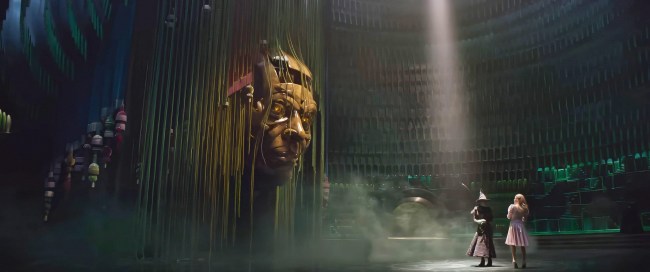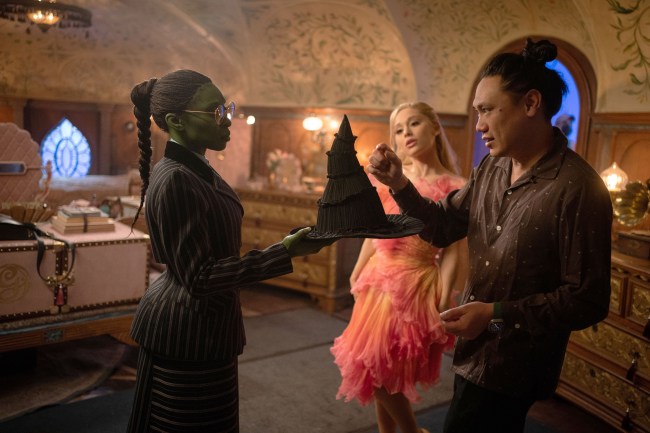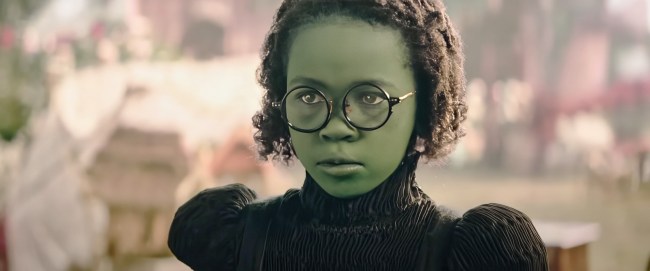By providing your information, you agree to our Terms of Use and our Privacy Policy. We use vendors that may also process your information to help provide our services. This site is protected by reCAPTCHA Enterprise and the Google Privacy Policy and Terms of Service apply.
How Does Elphaba Fly? ‘Wicked’ Director Jon M. Chu Wanted Answers, and a Broom Wasn’t It

Chris O'Falt
VP, Features Strategy

In “The Wizard of Oz,” Dorothy (Judy Garland) just needs to click her heels three times to be transported from the dreamland of Oz. But right from the opening shot of “Wicked,” director Jon M. Chu’s sweeping camera — flying up from the sea to the cliffs, over miles of landscape, past the flying monkeys — grounds his Oz in a tangible place.
“If you’re going to believe characters that exist there that have real stakes, then you have to believe that this place exists,” said Chu while he was a guest on IndieWire’s Toolkit podcast. “What I realized is in [‘Wicked’ the Broadway] show, you walk into a theater, and you are in Oz, it’s decorated that way, and the bubble comes down [with Glinda], and you absolutely buy in… but the perspective of a movie audience is very different.”
Knowing the implied magic of the Broadway stage would not necessarily translate to movie screens, Chu pushed the production to literally build the world of Oz. Spread over 17 soundstages and four backlots (two of which were larger than the size of four football fields), the physical world of Oz included a 60-ton Emerald City train, an enormous Wizard head that could be operated like a puppet, and a Munchkinland village with real thatched roofs and — through the magic of visual effects — would emerge from a nearby field of 9 million tulips that production designer Nathan Crowley planted.
But even before the wheels of the enormous production started to churn, Chu’s first few months on the project were spent with Stephen Schwartz and Winnie Holzman, who originally adapted Gregory Maguire’s 1995 book “Wicked” for the stage musical. Going line by line through the stagebook and the most recent draft of their screenplay, Chu got an education in all things “Wicked”: Why certain things happen, why certain scenes got cut out of the original, and what the writers felt was working and not working.

“I just listened, but sometimes I would ask a question: ‘Why does she do that thing? And where did she get flight? And what is her relationship with gravity?,’” said Chu of those early meetings. “And sometimes there were answers, sometimes they were like, ‘Well, you know, you just have to go with it.’ And those, ‘Oh, you have to go along with it’ things, those can work in theater, but in a movie I know the stakes are a little higher, the audience has a little bit higher bar to cross.”
Those “you have to go with it” moments, in Chu’s mind, were related to the conceit of theater, dependent of the audience’s awareness of the stage and that colorful sets could imply a magical world of singing, dancing, and a witch who could learn to fly. “But when you walk into a movie, you have to be convinced,” said Chu. “You have about 10 minutes to convince the audience that whatever world you’re building, the rules that you’re building, are enough for them to buy in.”
At the center of Chu’s concerns was Elphaba (Cynthia Erivo). To split the musical into two movies, the first would be grounded in Elphaba’s transformation into the Wicked Witch of the West, and she couldn’t simply be the odd green girl dropped into the musical world of Shiz University where she doesn’t fit in.
“When we started making the movie, Cynthia [said], ‘you know, I’m not a joke in this,’” recalled Chu. “She is not a joke in this, Elphaba has to be a full person, and it really clicked for us.”
Erivo’s message would stick with him, and part of the solution would be seeing this world through her character’s skeptical eyes.
“In our movie, she’s us, the audience, because she’s like, ‘What the hell did I just walk into? They’re singing and dancing here,’” said Chu. “When she walks into the dorm room in that first scene, I love that because it’s pink, and she’s this green girl looking around being like, ‘These people are crazy.’ It’s ‘Pleasantville,’ this idea of ‘Elf’ in reverse. And then in [the musical number] ‘Wizard and I,’ everything quiets down. She’s gotten the opportunity to be in the school and she whispers those first words, ‘Did that really just happen?’ It’s in a melody. And you’re like, ‘Oh, she can sing too.’ And then that song grows into such a huge song, and [we discover with her] she can sing better than anyone in Oz.”
With this opening number, you can see how Chu worked backwards from his biggest concern: What would become the grand finale of his first film, “Defying Gravity,” and Elphaba taking flight for the first time. The musical, emotional, magical, and physical logic of what propelled flight haunted Chu and would take months to finally crack.

“We have to plant flight [in ‘Wizard and I’], because what I found in ‘Defying Gravity’ is that it can’t be unearned,” said Chu. “She can fly, when did that happen? Not in the end, because we’ll plant these little moments of her relation to gravity… and show her slow ascent.”
In “Wizard and I,” animals gather around Elphaba. The crickets start to fly, bluebirds take off as she enters a field, and butterflies start to flutter around her as she moves toward higher plains as if she were on the cusp of taking off.
“That whole number is her ascension, she goes from the very bottom, below the ground actually, right on the cusp of water, but not touching water,” said Chu. “And it slowly builds on the staircase. The first things to pay attention to her are nature. It’s green frogs, the little green cricket, and all of them are there are finding ascension.”
For “Defying Gravity,” Chu carefully storyboarded it. For 15 years, dating back to “The League of Extraordinary Dancers,” he and cinematographer Alice Brooks and choregrapher Chris Scott had been collaborating on how, through a careful coordination of movement, they could defy gravity through music and dance. But when Chu went through his storyboards and the lyrics with his team, “Defying Gravity” still lacked its moment of lift.
“It felt she didn’t earn flight,” said Chu. One of our producers David Nicksay said to me, ‘There was something wrong. I know everybody liked it, but there’s something missing. And I really bang my head against the wall for a while, and realized it has to be from her.”
From the start, Chu never liked the answer that Elphaba was dependent on her broomstick for flight. In Chu’s mind, the broomstick was the equivalent of a wand, a tool to harness her powers, but ultimately, it needed to be about Elphaba’s relationship to gravity. The power needed to come from inside her.
“It can’t just be anger for the Wizard [that motivates flight] because that’s not what the movie has been about; it’s been her own self-worth and not realizing she has to prove herself to nobody,” said Chu.

The breakthrough for Chu became adding a moment of failure, falling at her first attempt at flight. She would fall to her lowest point before reaching her highest. It’s at that moment of failure, Elphaba starts to hear the whispers that have surrounded her her whole life, how she was different and couldn’t do things other girls could. It’s this reflection of her younger self that ultimately gives her flight.
“And to me, that was the moment that she finds purpose, ‘This is for my younger self, this is for me [and] for every little girl out there,” said Chu. “And that’s why we set up when she’s a child, and we had to put [Elphaba’s childhood] in [the movie], which is not in the show, to show in youth that she does have this relationship with grass, she doesn’t know how to harness it yet, but it extends her emotions, so the rocks go up and they go and in ‘Wizard and I,’ she makes that little extra leap, she has some extra special ability and we’ll see where this goes.”
You can subscribe to the Toolkit podcast on Apple, Spotify, or your favorite podcast platform. And you can watch Jon M. Chu’s full Filmmaker Toolkit interview on IndieWire’s YouTube page.
By providing your information, you agree to our Terms of Use and our Privacy Policy. We use vendors that may also process your information to help provide our services. This site is protected by reCAPTCHA Enterprise and the Google Privacy Policy and Terms of Service apply.

















